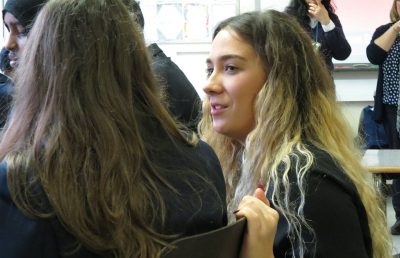
Meghan Brown ’15 (ED), ’16 MA spent the fall semester of her master’s year in London as part of the Neag School’s Study Abroad Teaching Internship Program. In London, Brown taught at Rooks Heath, a multicultural school in London with about 1,000 students ages 11 to 18. Brown is a graduate of the Neag School’s Integrated Bachelor’s/Master’s program; she currently serves as a teaching assistant at the U.S.-Mexico Commission for Educational and Cultural Exchange (COMEXUS) Fulbright-García Robles in Mexico.
Hometown: Groton, Conn.
Concentration: Secondary education, Spanish
Had you studied abroad before? “This was my second time studying abroad; my sophomore year, I was in Spain for five months. I didn’t know how different the U.K. was going to be when I came here. I had that big culture shock. There’s no way to compare my experience in Spain to my experience in the U.K. It’s different; I’m in a different place in my life, and I’ve learned to embrace that things are different, and they’re not going to be the same everywhere you go.”
What did you learn, teaching in classrooms in the U.K.? “To be able to understand that your students are different; they’re not all pulling from the same educational background that you had. They come from different places, and you need to understand those differences and embrace them instead of minimalizing them. … It has to be individualized; no one’s the same. I think I understand that better now that I’ve been here [in London], in working with my students; a lot of them are asylum seekers and refugees. You need to understand that, and see how it affects their education, [and] to recognize it and not just push it to the side.”
“I’ve learned to ask my students, ‘Are you OK? What’s bothering you?’ and not being scared of the answer.” Meghan Brown ’15 (ED), ’16 MA
How has this experience changed your view on teaching? “I’ve never felt more ready. … I’ll go home and I’ll look at the education system a little bit differently. I’ll be able to look at it with a more critical view and a more outside perspective — coming at it with a different eye.”
How have you or your intended career path changed as a result of this experience? “I’ve had the opportunity here to work with a program called The Children Looked After. It’s a foster care system. That gave me a different perspective of something outside the classroom, of what the students were dealing with on the outside, and showed me what being a social worker or psychologist at a school would be like. … I’m working with ELL [English Language Learners], and I absolutely love it. I think I’m going to switch over, transfer from Spanish and go more into ELL. I’m really interested in the transition of immigrants coming from a different country into our school systems. … So I definitely shifted professionally in that aspect.”
What’s one takeaway from this Study Abroad experience that you will carry with you into your career? “You realize you are going to make mistakes. I was always like, ‘You don’t want to offend anyone; you don’t want to step over the line.’ But you have to ask questions; otherwise, you won’t understand. So I’ve learned to ask my students, ‘Are you OK? What’s bothering you?’ and not being scared of the answer.”
 Facebook
Facebook
 Twitter
Twitter
 LinkedIn
LinkedIn
